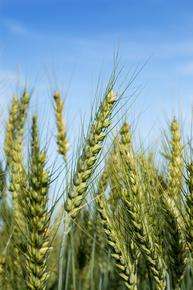Researchers to sequence two wheat chromosomes

The German Federal Ministry of Food and Agriculture announced today that it would award 1.5 million Euros to a project aimed at providing a reference sequence for two wheat chromosomes, part of the international effort to decipher the bread wheat genome, led by the International Wheat Genome Sequencing Consortium (IWGSC).
This is a major step towards achieving a high quality reference sequence for each of the 21 bread wheat chromosomes. The expected outcome is a new generation of tools for wheat breeders to accelerate breeding programs and produce a new generation of wheat varieties with higher yields and improved sustainability.
Reference sequencing of wheat chromosomes 6A and 2D will be carried out over the next two years by the teams of Nils Stein and Uwe Scholz of the Leibniz-Institute of Plant Genetics and Crop Plant Research (IPK Gatersleben) – respectively leading the research groups Genomics of Genetic Resources and Bioinformatics and Information Technology – and by Klaus Mayer, leader of the Plant Genome and Systems Biology research group at the Helmholtz Zentrum München.
The teams will use high throughput sequencing technologies and the latest bioinformatics tools to sequence and assemble the genome, and precisely locate the genes along both chromosomes. Describing the project, Nils Stein explained: "The project will underpin the important goals of the IWGSC towards delivering a genome-wide high quality reference sequence of bread wheat – one of the most important food crops in the world. It is very important that Germany's Ministry of Food and Agriculture has identified this as a priority and is supporting this longer lasting research effort."
Beat Keller, of the University of Zurich in Switzerland and IWGSC Board and Leadership team member, welcomed the news: "Germany has a well-established excellence in plant genome research, with significant efforts in barley and sugar beet genomics, for example. At IWGSC, we are excited about the decision for a very strong commitment also in wheat genomics. This contribution is very significant for the completion of the international project to achieve a high-quality sequence of the whole bread wheat genome."
Of the 21 wheat chromosomes, only one – chromosome 3B – is currently sequenced to high quality. Reference sequencing of 14 other chromosomes, in addition to the 6A and 2D project, is currently underway in 12 countries under the leadership of the IWGSC and will be completed in the next two years. The IWGSC is still seeking funding for reference sequencing of four wheat chromosomes. Provided that additional funding is secured soon, the IWGSC anticipates that a high-quality genome sequence for bread wheat could be publicly available by 2019.
Wheat is the most widely grown cereal crop in the world and the staple food for more than 35% of the global human population. It accounts for 20% of all calories consumed throughout the world. As global population grows, so too does its dependence on wheat. To meet future demands of a projected world population of 9.6 billion by 2050, wheat productivity needs to increase by 1.6% each year. Since availability of new land is limited to preserve biodiversity and water and nutrient resources are becoming scarcer, the majority of this increase has to be achieved via crop and trait improvement on land currently cultivated. A high quality reference genome sequence would contribute greatly to achieving this goal.
More information: For more information, see www.wheatgenome.org/Projects/I … reference-sequencing
Provided by International Wheat Genome Sequencing Consortium




















